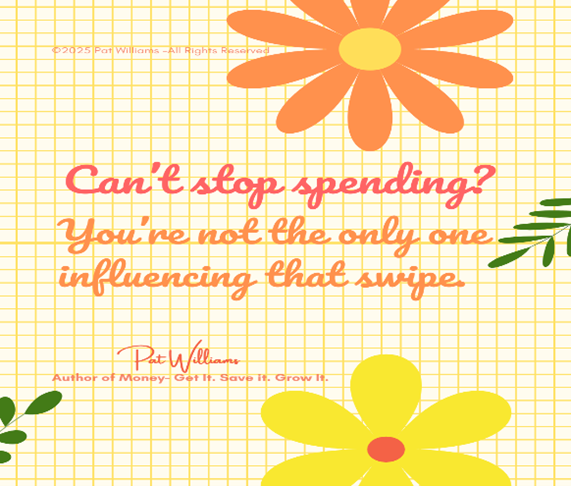Do you make a list and check it twice or, maybe three times, when you shop … whether it’s for the grocery store—kid’s clothing—yourself—or gifts?When you have a list, you typically spend less…that is, if you stick to it.
Giving Money Away
Money is good for a variety of reasons. The first two are to spend and save. The third thing money is good for is giving it away. You may be thinking that you don’t have any extra money to give away. Often, giving away is not in the form of hard cash. Consider what you do have that a worthwhile group may need; your skills and time.
Just throwing money at a problem doesn’t always solve a problem. One way to solve a problem is by donating your skills and time.
Do you have a car? Over 90 percent of the population has at least one. How about volunteering to drive someone to their doctor’s appointments or physical therapy? When election times surface, there is the opportunity to drive some to the polls to vote in person, or even to a ballot drop box.
You will be surprised at how many groups and organizations need willing workers.
Over the years I have:
· Volunteered at hospitals
· Answered the telephone for my local public broadcasting station
· Picked up trash on Earth Day with Students from a local elementary school
Here’s a list of organizations that can always use volunteers:
Animal shelters
Assisted living facilities
Childcare centers
Food pantries
Hospice
Hospitals
Local parks and recreational areas
Religious organizations
Here’s some other suggestions.
In some areas people are volunteering read to children in day care centers and in assisted living communities. Some get into the characters of their books. One woman dresses up like Mother Goose and tells stories to children.
Habitat for Humanity needs people with carpentry skills or who like to paint.
Think of organizations like food pantries that need can goods and other non-perishables—plus they need onsite folks to fill bags and boxes for those who are in the drive-in lines.
Do you have a lot of books gathering dust on your shelves? Donate them to your local library, a school, woman’s shelter—especially in the self-help and how-to genres. Many local libraries have book sales once a year. Don’t forget to scout around in your own neighborhoods. Free Libraries have popped up on front yards—take a book … leave a book. Why not yours?
Watch for our next blog where I’ll illustrate how to judge whether or not an organization is meeting its goals. So important to understand how much of donated funds actually land in a recipient’s hands.
Patricia Lane Williams, CPA has worked with thousands of men and women sounding the warnings. She is the author of the Amazon bestseller, Money: Get It. Save It. Grow It … Before Debt Steals It. It’s her first book in the Four Corners Prosperity series. Her website is www.PatWilliamsAuthor.com.
What’s in YOUR Wallet? Two Must Have Memberships You Should Have
Smart Shoppers Start with a List
YOU and YOUR MONEY must be on alert!
What’s in your mind … is it a GOAL?
Checkless … Should You? Do You?
The Monster Spending Season Is Beginning
The Monster Spending Season Is Beginning
Throughout the year, I have blogged about spending and misspending. About being wise about where your money goes and not to let your credit cards run away with you. This is the season to create a Gifting Budget. To make a list—with names to give to and the what you would like to give. To keep your eyes peeled but special buys.
As this month unfolds, the biggest Spending Season of all rolls out. I know, I know, the reality is that it seems we are always in one kind of spending season or another! Birthdays, Back to School. Kids out growing their shoes. But the Holidays … it’s the spending monster time.
Soon, Amazon will bubble up it’s Prime Days … Use them. I’ve found items with deep discounts during this time that bubble up when I put the type of product in Amazon’s search box and waited to see what popped up. You did know that Amazon is the #3 search engine, behind Google as #1 and YouTube as #2.
During Amazon’s Prime days—remember Black Friday—which sometimes starts the Monday before for bargain hunters … and Cyber Monday for digital and electronic stuff. You may be able to score an amazing deal.
I was the oldest of four children—two girls and two boys. Our mother made my sister's and my clothes and her own clothes as well. But those, then, were the days of stay-at-home moms. In many families, it was assumed that mothers were seamstresses and masters at everyday clothes and the coveted Halloween custom. A coveted possession was a Singer sewing machine.
Today’s moms aren’t. Many hold down full-time jobs, are the driver of the car pool … and buy most clothes commercially. The arts and crafts and DIY markets are alive and well … just not for making every day clothes.
What this all means is that times will continue to evolve and change. Where in the past, many items were “homemade” … and certainly Christmas time, Mother’s and Father’s days brought out items from kids—most will gift others through shopping. Online and In-person.
Which means you really must plan ahead! This is the season to create a Gifting Budget. To make a list. Check it twice … and promise yourself you will stick to it.
Patricia Lane Williams is a retired CPA and has worked with thousands of men and women sounding the warnings. She is the author of the Amazon bestseller, Money: Get It. Save It. Grow It … Before Debt Steals It. It’s her first book in the Four Corners Prosperity series. Her website is www.PatWilliamsAuthor.com.
Shoppers Beware … Your Mailbox is Stalking You
Shoppers Beware …
Your Mailbox is Stalking You
August is almost gone and soon your mail boxes—the snail mail, the email, and your text messages—will be full of ads and promos touting Holiday sales. For many of us that means pulling out a credit card, whether it be American Express, Visa, Master Card, your bank's credit card or a specialized store’s. America’s favorite pass time of exploring and shopping is off!
Credit cards can be good, bad or ugly …
Let's look at the good … and there is a good side to them.
There are situations where you need a credit card, including emergencies. You know that they can happen, and at any time.
If you have a credit card, you typically carry less cash.
Some credit cards have cash back rewards. Others have "points" that may be used toward purchases or to lower your bill.
If your credit card is stolen or someone has obtained your number, credit card companies can easily reverse the charge. It’s smart to have a list somewhere that you can access easily with the name of your credit cards; the account number including expiration date and code; and customer service phone number—have you ever noticed how small they are on your card, almost unreadable, needing a magnifying glass! Make sure you update replacement and renewed cards … there is always a change on the expiration date and the code.
If you are a traveler, you need a credit card to rent a car or book a reservation. For Hotels, you need a credit card and to book a flight. Cash is not king here!
The Bad
It's easy to run up a large credit card car balance, many times unconsciously.
It's tempting to buy more and pay more for an item when using a credit card. Let’s face it—shopping with a credit card in hand is almost too simple.
It’s not uncommon to be lured in with a “you only have to pay a small fraction of the balance” becomes an entice to spend more. Gulp.
The Ugly
The more credit cards you have, the easier it is to get another and another and another. Another big gulp. And here’s the truth: credit card companies sell their mailing lists.
When you have a credit card it become easy to justify a purchase.
It’s on sale. You've been wanting that particular item for a long time. Or, you need to get a gift for someone.
Fraud Alert
You will receive a lot offers for credit cards in the mail. It’s a smart move to have a shredder—you can get one for as little as $30. Shred your junk credit card offers into little bitty pieces that are perfect for garbage dumping. Do not simply toss the envelop into your trash. Why? It has your name on it—the dumpster trash thieves will love you!
Patricia Lane Williams is a retired CPA and has worked with thousands of men and women sounding the warnings. She is the author of the Amazon bestseller, Money: Get It. Save It. Grow It … Before Debt Steals It. Her website is www.PatWilliamsAuthor.com.
Are You Suffering From a Bad Case of Brokenness?
Spending Seasons … the Big One Is Coming!
Spending Seasons … the Big One Is Coming!
Rapidly, we coming onto another spending season. The … Big … ONE!
Throughout the year, there are many selected spending seasons: back to school, special occasions like anniversaries and birthdays, Memorial weekend, Veterans Day, Mothers and Father’s Day, Halloween, Thanksgiving, Black Friday and Cyber Monday, weddings …and of course, the BIG ONE: Christmas
Retail stores shout out specials and deals. I always tune into Memorial Day weekend events—it’s because my local garden stores like Home Depot and Lowe’s have amazing discounts on bags of mulch for the garden … as in five for $10 versus the usual $4 for each! Who doesn’t want to get a true two for one?
All such occasions may hit you were hurts, in your wallet and credit card and the wrong time. Just as you think you are getting your financial life in order, paying off your credit cards and charge accounts along comes a birthday or an anniversary or a special occasion in your workplace. The basket or hat emerges and YOU are expected to add something for the special occasion kitty from your coworkers.. And everybody chips in.
At the accounting firm where I got my experience for my CPA license as a newbie accountant, the partners gave the secretarial staff a “kitty” to cover special occasions. The partners actually funded it, so no one had to pull from their own wallets. It was a welcomed benefit for all of us who were just starting out and living on the month-to-month plan.
As you make a list of all the things that need to go into your budget remember to make room for Spending Seasons. And if the basket gets passed to you in your workplace, if you can only add $2, that’s what you add. You don’t need to put yourself into a financial bind.
And a suggestion … create a special place that you can build a “stash” for occasions. One of my friends had a large 5-gallon water container that he dropped all coins and one-dollar bills into. He did it for 18 years from the day of his daughter’s birth … enough money was stashed to funded her first year of college.
Patricia Lane Williams, is a retired CPA has worked with thousands of men and women sounding the warnings. She is the author of the Amazon bestseller, Money: Get It. Save It. Grow It … Before Debt Steals It. It’s her first book in the Four Corners Prosperity series. Her website is www.PatWilliamsAuthor.com.
Smart Shoppers Start with a List
What Are Your Needs, Wants, and Desires?
Everyone needs three things: food, shelter, and clothing. It’s the basics for survival. What are yours?
Needs
And it’s the basics that need to be addressed first. In fact, I would put that in my “always” column for living. Just what are they—understanding that they will vary from person to person.
Wants and desires are simply degrees of needs. Take time to ponder your actual needs. Some people need a special diet so their needs may look quite different from yours. Some jobs require a uniform while others have a dress code. If you have children, a whole new set of needs come into play.
Wants
Where you live will depend on what you can afford. As a college freshman I lived in a dorm. The next three years I lived off-campus in a private home with seven other girls.
After graduations, I wanted space from the noise and chaos that so many under one roof can create. When I moved to New York City I wanted an apartment I didn’t have to share with anyone. It was what I needed … and desired at the same time. I kept looking until I found the perfect small apartment for me on the Upper East Side. It was time … but it was now what I desired … and needed.
Desires
After eight years in New York City, an opportunity arose in Denver, Colorado. I took a job with MicroMash, the first company that introduced study for the CPA exams on disc in addition to the traditional print book which would require to move. I have lived on both coasts—New York City, New York to Lemon Grove, California. It was time to settle in the central part of the country.
My family had lived in Colorado when I was in high school and loved the state. This would be the third time I lived in Colorado so I was determined to stay. No more moving—that was my desire and decided to buy a house.
The Federal Government had de-commissioned Lowry Air Force Base and sold the land to developers. My oldest brother had worked in construction so I got him to look over a similar development by the same developer. He checked it out and said the developer did good work. It was all I need to hear 25 years ago. I had done my research and I saw my dream house. I bought one of the first houses built in Lowry. I desired it. I’m still here.
Decision making takes some planning. It’s usually seeded with the “wants” and “desires” that evolve over time. For you, take the time to identify your basic needs, then your wants, and finally your desires and then you can move forward.
Patricia Lane Williams is a retired CPA and has worked with thousands of men and women sounding the warnings. She is the author of the Amazon bestseller, Money: Get It. Save It. Grow It … Before Debt Steals It.
Her website is www.PatWilliamsAuthor.com.
YOU and YOUR MONEY must be on alert!
Giving Money Away
Money is good for a variety of reasons. The first two are to spend and save. The third thing money is good for is giving it away. You may be thinking that you don’t have any extra money to give away. Often, giving away is not in the form of hard cash. Consider what you do have that a worthwhile group may need; your skills and time.
Just throwing money at a problem doesn’t always solve a problem. One way to solve a problem is by donating your skills and time.
Do you have a car? Over 90 percent of the population has at least one. How about volunteering to drive someone to their doctor’s appointments or physical therapy? When election times surface, there is the opportunity to drive some to the polls to vote in person, or even to a ballot drop box.
You will be surprised at how many groups and organizations need willing workers.
Over the years I have:
· Volunteered at hospitals
· Answered the telephone for my local public broadcasting station
· Picked up trash on Earth Day with Students from a local elementary school
Here’s a list of organizations that can always use volunteers:
Animal shelters
Assisted living facilities
Childcare centers
Food pantries
Hospice
Hospitals
Local parks and recreational areas
Religious organizations
Here’s some other suggestions.
In some areas people are volunteering read to children in day care centers and in assisted living communities. Some get into the characters of their books. One woman dresses up like Mother Goose and tells stories to children.
Habitat for Humanity needs people with carpentry skills or who like to paint.
Think of organizations like food pantries that need can goods and other non-perishables—plus they need onsite folks to fill bags and boxes for those who are in the drive-in lines.
Do you have a lot of books gathering dust on your shelves? Donate them to your local library, a school, woman’s shelter—especially in the self-help and how-to genres. Many local libraries have book sales once a year. Don’t forget to scout around in your own neighborhoods. Free Libraries have popped up on front yards—take a book … leave a book. Why not yours?
Watch for our next blog where I’ll illustrate how to judge whether or not an organization is meeting its goals. So important to understand how much of donated funds actually land in a recipient’s hands.
Patricia Lane Williams, CPA has worked with thousands of men and women sounding the warnings. She is the author of the Amazon bestseller, Money: Get It. Save It. Grow It … Before Debt Steals It. It’s her first book in the Four Corners Prosperity series. Her website is www.PatWilliamsAuthor.com.
How’d You Get So Broke?
Sometimes a Word Doesn’t Mean What You Think it Does
Sometimes a Word Doesn’t Mean
There are three essential things you need to know about money:
1. Words have power. They may convey emotions that were created when you heard lines like: Mom always loved you best We the people …
2. Words change. The meanings … and sometimes the spelling! A word can be used one way one day and totally change the next.
3. Words can, and will be used differently, by different people—cultures, genders, and ages. Every profession, law and political organization, businesses large and small, use some of the same terms to talk about money.
Since I am talking about money today … and just to you … let’s consider two words pertaining to your money: debits and credits.
Your Bank Account
You and your bank look at your bank account from different viewpoints. Let’s say you deposit a $100. When you make that deposit the bank says it has “credited” your account. When you write a check the bank says it has debited your account.
Your Credit Card
Let’s say you spend $85 on groceries using your credit card. Your credit card will reflect a debit and in turn creates an asset for the credit card company—a credit to it. In turn, the credit card company must now pay the vendor who the money was collected for BUT, the credit card company gets paid a percentage of the amount collect as its “fee” … a net credit to it.
Remember this about credit cards: For credit card companies, debits increase their assets via credit card processing fees—a HUGE credit that collectively amounts in excess of 160 BILLION dollars a year. That is an OMG!
Merchants view processing credit cards as part of the business. You many have noticed that many are not charging you an “extra amount”—either set or a percentage of your purchase to cover the cost.
If you want to help a merchant out … write a check or pay cash. To HELP YOU OUT, always pay your credit card balance off within 30 days to avoid additional interest charges.
Patricia Lane Williams, CPA has worked with thousands of men and women sounding the warnings. She is the author of the Amazon bestseller, Money: Get It. Save It. Grow It … Before Debt Steals It.
Her website is www.PatWilliamsAuthor.com.
LOWERING YOUR CREDIT CARD INTEREST RATE okay
If you have credit cards . . . with or without balances . . . Get them out and research each card issuer and determine if there are any specials for new accounts -- the ones that offer reduced rates.
If you succeed than this is what I want you to do. Do not reduce your payments on an outstanding balance. Because the interest rate get hold of more moneys lower your minimum payment is reduced but ignore it. Always pay more than the minimum to reduce the balance.
GET HOLD OF MORE MONEY
Need more money? Here's a list of short term solutions. Sometimes referred to as ''side hustles.''
Sell stuff. Everyone has a lot of stuff just lying around the house collecting dust. Your stuff could be somebody else's treasure.
Sell at a flea market. Sometimes called swap meets you can find any number of flea markets by searching online.
Have a yard sale. No matter what you call them yard, tag, or garage sale once the stuff leaves the house it it never comes back. back.
Make stuff'. Are you a creative person? Like to work with your hands knitting, crocheting ,woodworking? I know one woman who does quite well by taking photographs and turning them into greeting cards and selling them on her own website. Search the web and you'll find many more groups willing to sell your stuff.
Get a part-time job. Part-time jobs have been known to lead to full-time jobs or a changes in careers.
Make it stand out
Is Debt Stealing Your Money?
To get hold of your money, you will have to understand what it is, how it works, how other people affect your money decisions, and how to stay in control when it seems the entire world is falling apart. Within the pages ofMONEY: Get It. Save It. Grow It., you are going to learn the real basics of money management. Basics that are rarely taught today—basics every adult needs to succeed financially.

















